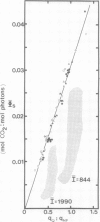Abstract
The partitioning of noncyclic photosynthetic electron transport between net fixation of CO2 and collective O2-dependent, dissipative processes such as photorespiration has been examined in intact leaf tissue from Nicotiana tabacum. The method involves simultaneous application of CO2 exchange and pulse modulated fluorescence measurements. As either irradiance or CO2 concentration is varied at 1% O2 (i.e. absence of significant O2-dependent electron flow), the quantum efficiency of PSII electron transport (φse) with CO2 as the terminal acceptor is a linear function of the ratio of photochemical:nonphotochemical fluorescence quenching coefficients (i.e. qQ:qNP). When the ambient O2 concentration is raised to 20.5% or 42% the qQ:qNP is assumed to predict the quantum efficiency of total noncyclic electron transport (φ′se). A factor which represents the proportion of electron flow diverted to the aforementioned dissipative processes is calculated as (φ′se − φse)/φ′se where φse is now the observed quantum efficiency of electron transport in support of net fixation of CO2. Examination of changes in electron allocation with CO2 and O2 concentration and irradiance at 25°C provides a test of the applicability of the Rubisco model to photosynthesis in vivo.
Full text
PDF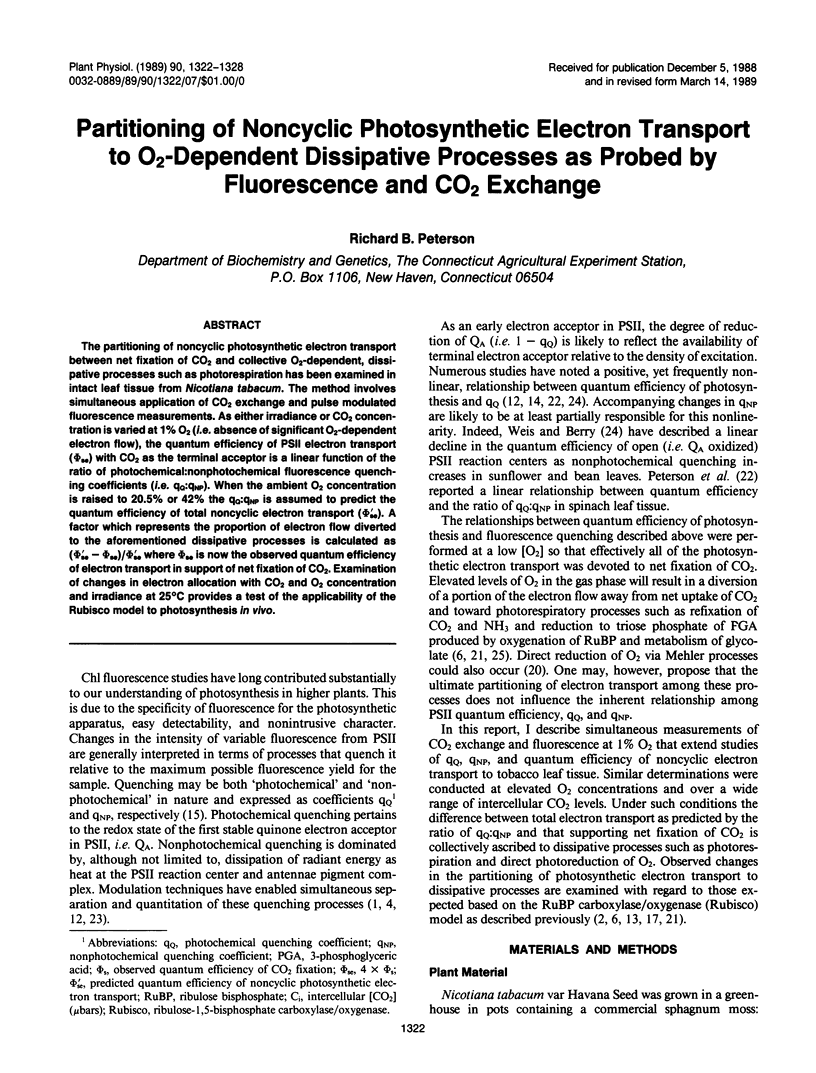
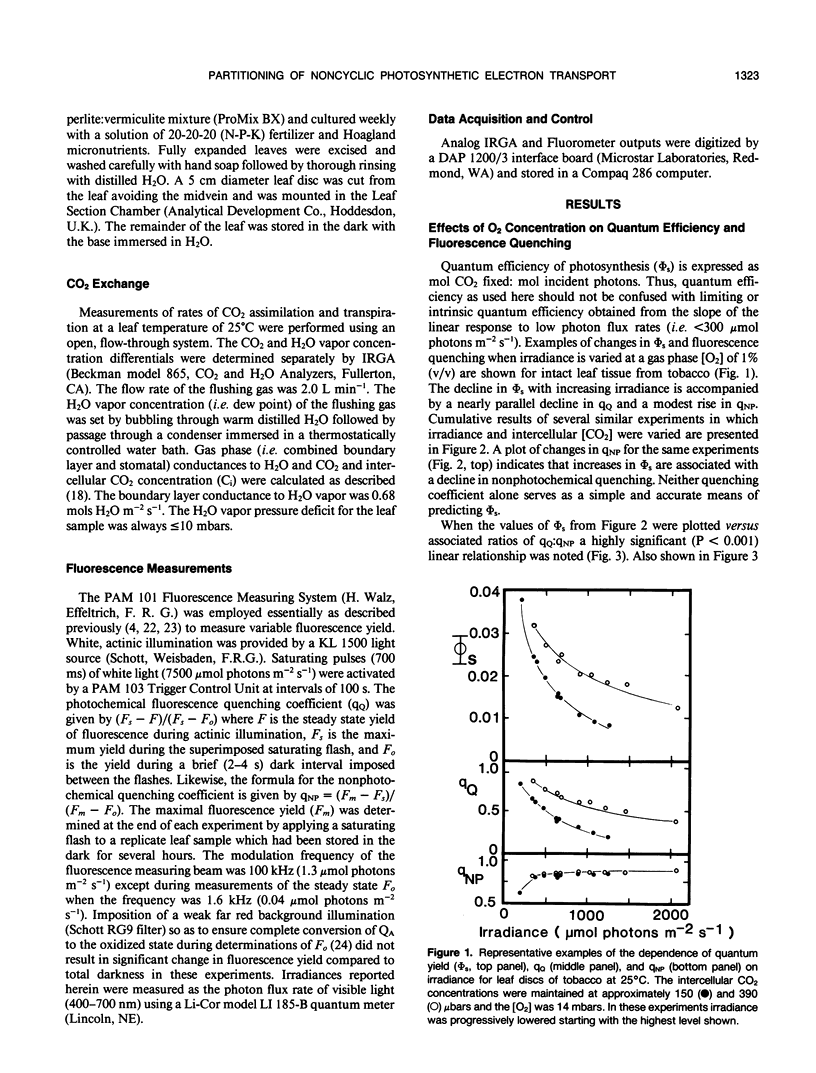
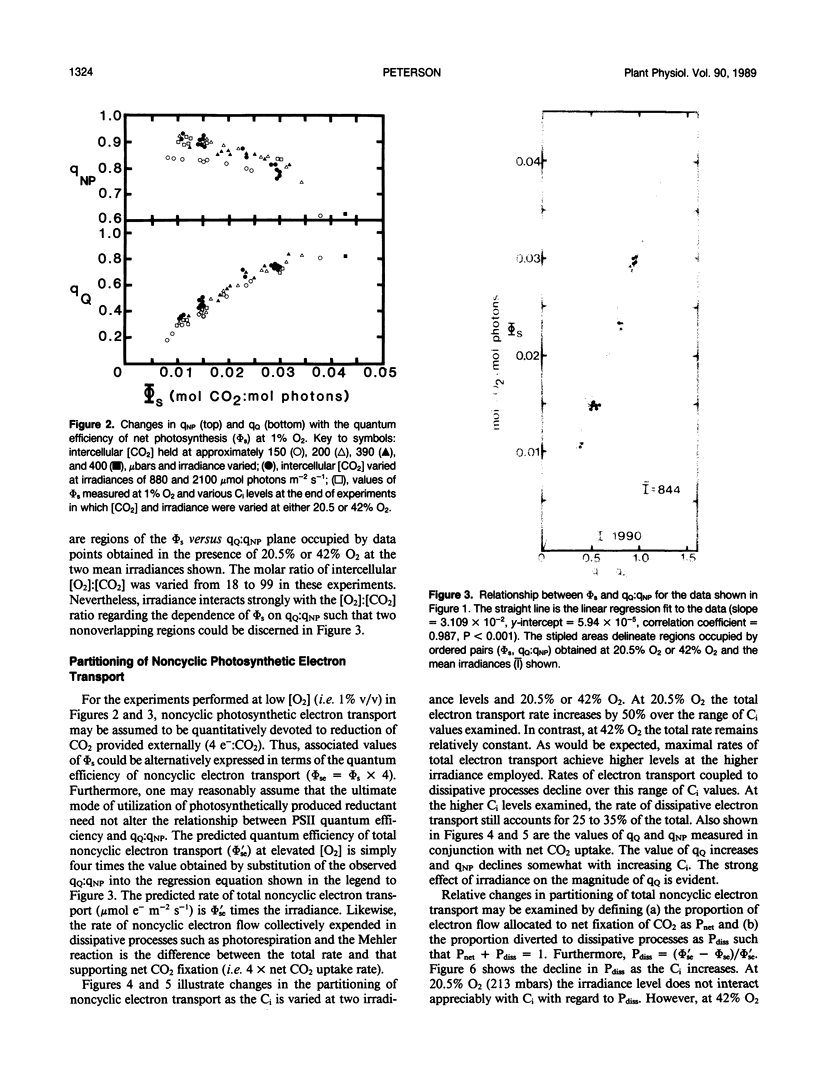
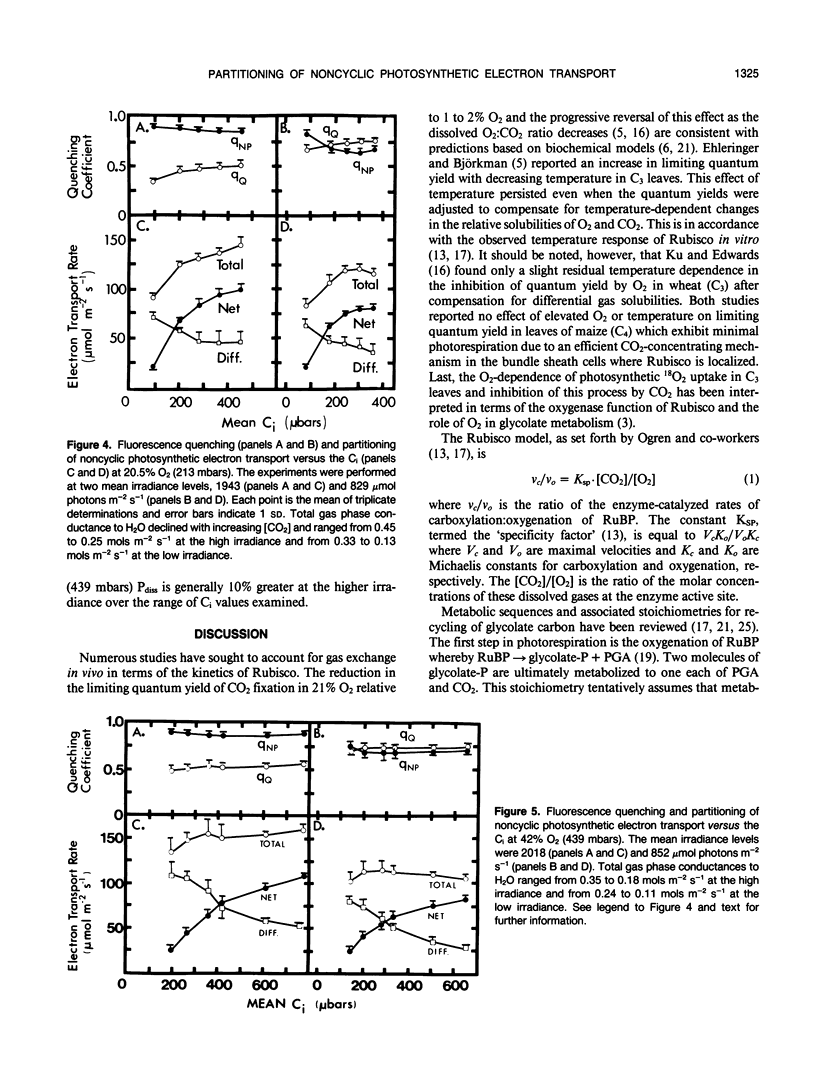
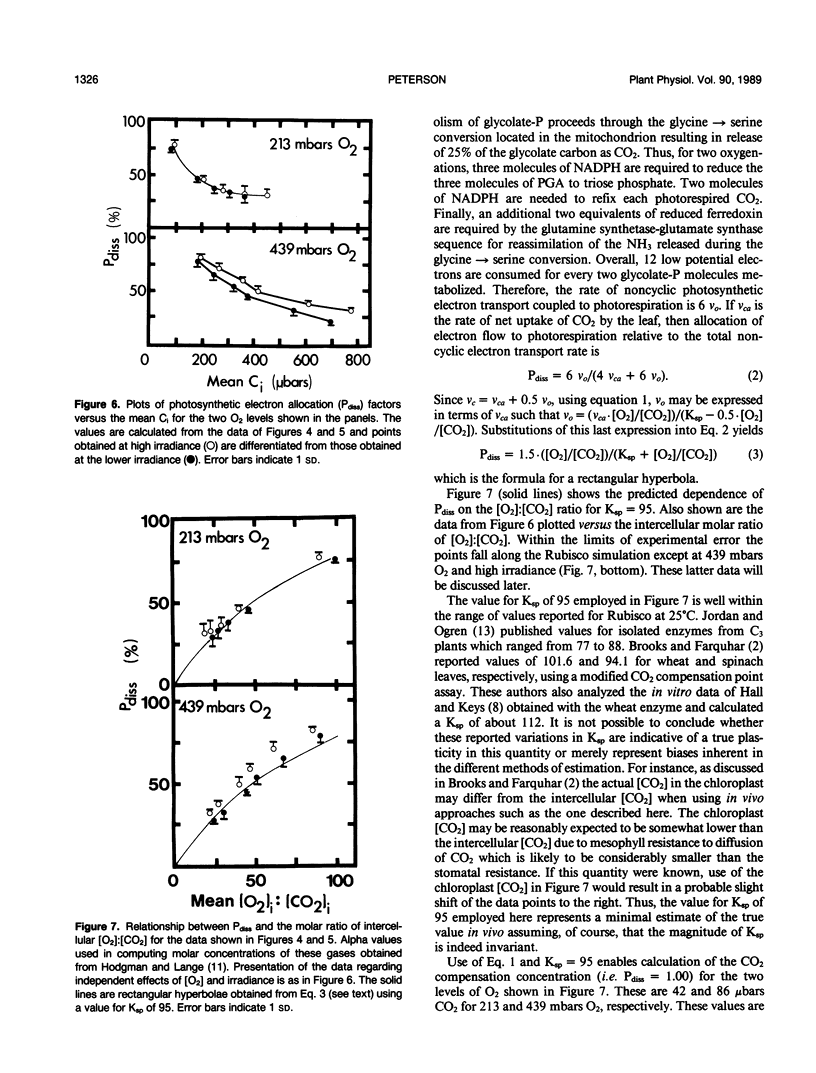
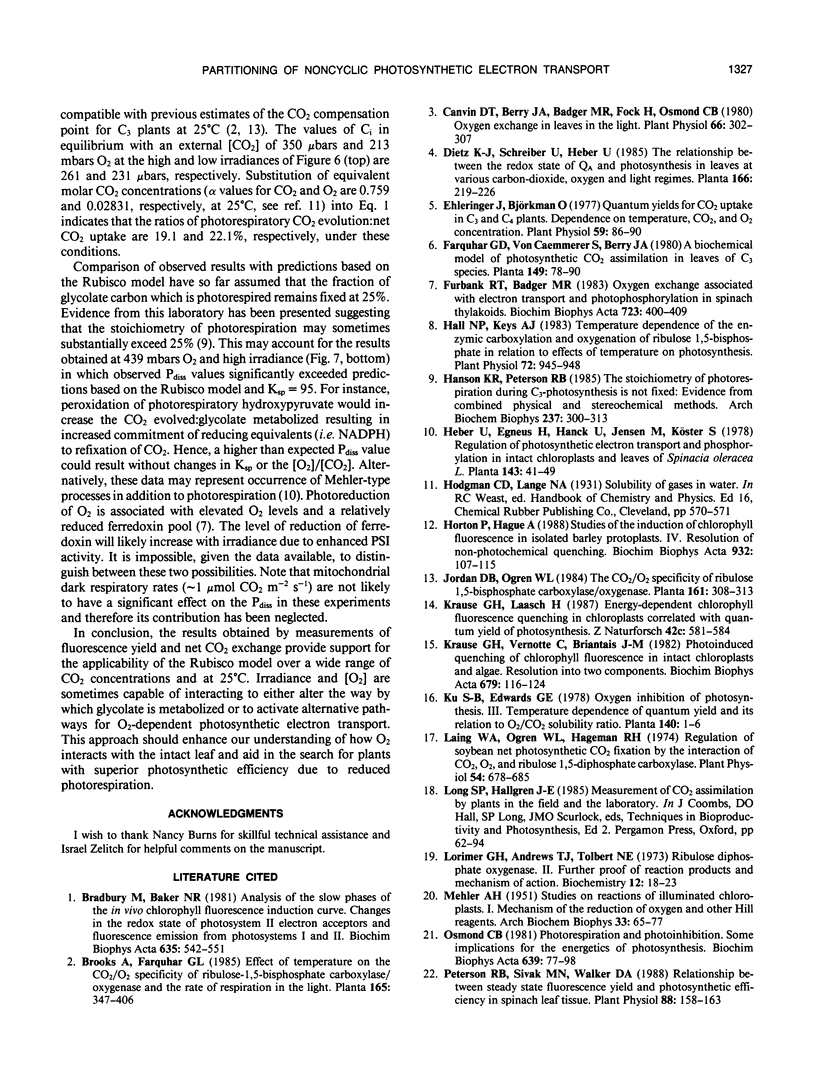

Images in this article
Selected References
These references are in PubMed. This may not be the complete list of references from this article.
- Bradbury M., Baker N. R. Analysis of the slow phases of the in vivo chlorophyll fluorescence induction curve. Changes in the redox state of photosystem II electron acceptors and fluorescence emission from photosystems I and II. Biochim Biophys Acta. 1981 May 13;635(3):542–551. doi: 10.1016/0005-2728(81)90113-4. [DOI] [PubMed] [Google Scholar]
- Canvin D. T., Berry J. A., Badger M. R., Fock H., Osmond C. B. Oxygen exchange in leaves in the light. Plant Physiol. 1980 Aug;66(2):302–307. doi: 10.1104/pp.66.2.302. [DOI] [PMC free article] [PubMed] [Google Scholar]
- Ehleringer J., Björkman O. Quantum Yields for CO(2) Uptake in C(3) and C(4) Plants: Dependence on Temperature, CO(2), and O(2) Concentration. Plant Physiol. 1977 Jan;59(1):86–90. doi: 10.1104/pp.59.1.86. [DOI] [PMC free article] [PubMed] [Google Scholar]
- Hall N. P., Keys A. J. Temperature dependence of the enzymic carboxylation and oxygenation of ribulose 1,5-bisphosphate in relation to effects of temperature on photosynthesis. Plant Physiol. 1983 Aug;72(4):945–948. doi: 10.1104/pp.72.4.945. [DOI] [PMC free article] [PubMed] [Google Scholar]
- Hanson K. R., Peterson R. B. The stoichiometry of photorespiration during C3-photosynthesis is not fixed: evidence from combined physical and stereochemical methods. Arch Biochem Biophys. 1985 Mar;237(2):300–313. doi: 10.1016/0003-9861(85)90281-4. [DOI] [PubMed] [Google Scholar]
- Laing W. A. Regulation of Soybean Net Photosynthetic CO(2) Fixation by the Interaction of CO(2), O(2), and Ribulose 1,5-Diphosphate Carboxylase. Plant Physiol. 1974 Nov;54(5):678–685. doi: 10.1104/pp.54.5.678. [DOI] [PMC free article] [PubMed] [Google Scholar]
- Lorimer G. H., Andrews T. J., Tolbert N. E. Ribulose diphosphate oxygenase. II. Further proof of reaction products and mechanism of action. Biochemistry. 1973 Jan 2;12(1):18–23. doi: 10.1021/bi00725a004. [DOI] [PubMed] [Google Scholar]
- MEHLER A. H. Studies on reactions of illuminated chloroplasts. I. Mechanism of the reduction of oxygen and other Hill reagents. Arch Biochem Biophys. 1951 Aug;33(1):65–77. doi: 10.1016/0003-9861(51)90082-3. [DOI] [PubMed] [Google Scholar]
- Peterson R. B., Sivak M. N., Walker D. A. Relationship between Steady-State Fluorescence Yield and Photosynthetic Efficiency in Spinach Leaf Tissue. Plant Physiol. 1988 Sep;88(1):158–163. doi: 10.1104/pp.88.1.158. [DOI] [PMC free article] [PubMed] [Google Scholar]



